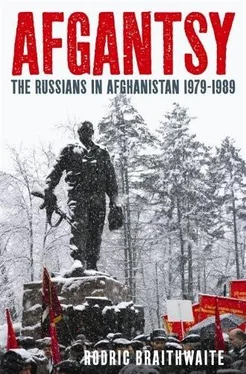Hoping they might calm things down, Puzanov and his three senior colleagues went to the palace. Taraki and Amin were waiting for them. The Russians read out another appeal for unity from Brezhnev. Taraki welcomed the appeal in fulsome terms. Amin followed suit, asserting in even more sycophantic language that he was honoured to serve under Taraki: if service to Taraki and the revolution required his own death, he would be happy to make the sacrifice. 11The four Russians left, satisfied by the appearance of reconciliation.
Later they heard (and reported to Moscow—incorrectly) that Amin and Taraki had reached some agreement. They did not know the details. But they congratulated themselves that their visit, and the appeal from Comrade Brezhnev, had calmed things down: ‘Amin did not resort to extreme actions, as he was convinced that the Soviet side would not support any actions which might aggravate the situation in the Afghan leadership and work against the unity of the PDPA.’ 12This massive misjudgement was a measure of how far the Soviet representatives were out of touch with what was actually going on.
The following morning Puzanov and his three senior colleagues called on Taraki once again. At last Taraki spoke openly about his difficulties with Amin. Dmitri Ryurikov, a Soviet diplomat acting as Puzanov’s executive assistant and interpreter, recorded the conversation in the diary he was keeping for his ambassador.
‘I noticed long ago,’ Taraki told the Russians, ‘that Amin has the tendency to concentrate power in his own hands but I did not attach any particular significance to this. However, recently this tendency has become dangerous.’ He went on to complain about Amin’s refusal to accept criticism, the way he was building up his own public position, the authoritarian way he treated his ministers, and the way he had placed his relatives in key government and party posts. ‘One family is ruling the country just as it was in the times of the King and Daud.’
Reversing the assurances he had given to Brezhnev, Taraki now confessed that he had had doubts about Amin even before he left for Havana. Since his return Sarwari had informed him of three separate conspiracies launched by Amin, who had aborted them once he realised that they had been uncovered.
He went on to tell the Russians that his talks with Amin the previous day had not (as they had thought) resulted in agreement. Amin had again demanded that the four ministers be sacked. Taraki had accused Amin of persecuting them and forcing them into hiding. He, Taraki, was the commander-in-chief of the armed forces, and Amin must obey his orders. Amin had smiled and said that, on the contrary, it was he who commanded the troops. Now, said Taraki, open conflict could not be ruled out. He was prepared to go on working with Amin, but only if Amin abandoned his present policies of repression.
The Russians suggested that Amin be invited to join the discussions, and Taraki telephoned him accordingly. As they were waiting, the KGB representative, General Boris Ivanov, remarked that there were persistent rumours of a plot to kill Amin when he got to the palace. Taraki pooh-poohed the idea.
Taraki’s aide Tarun then went out to meet Amin. A few minutes later, there was a burst of automatic fire on the other side of the door. Gorelov went to the window and saw Amin running towards his car. There was blood on the sleeve of his shirt.
Ryurikov was sent out to see what had happened. Tarun was lying halfway down the stairs. He had bullet wounds in his head and chest. A sub-machine gun was lying on the floor. There was still gun smoke in the stairwell. Taraki’s wife was there too: she had come out of the bedroom to see what was going on.
Taraki’s bodyguard came in and reported with a crisp military salute that, when Amin had begun to walk up the staircase, Tarun had told Taraki’s guards to leave and threatened them with his pistol. When they refused he fired at one of them and they killed him immediately.
Taraki then rang Amin to tell him that what had happened was the result of a misunderstanding with the guards. But after he put the receiver down he told the Russians that it had been a deliberate provocation. He agreed that the Russians should go to see Amin straight away.
All the Afghans involved in the shoot-out on the staircase died then or soon afterwards. None of the Russians actually saw what happened. This has left room for two alternative explanations. The first is that it was a put-up job by Amin designed to give him the excuse to arrest Taraki. The second is that there really was an attempt to get rid of Amin that went wrong. Ryurikov later inclined to the former view: assassination was not Taraki’s style, whereas Amin came from a family which was notorious for the bloody way in which it conducted its feuds and its political intrigues. 13
Amin himself fled to the Ministry of Defence, and ordered his troops to surround the Palace, disarm the guard, and arrest Taraki. Two hours later Kabul Radio announced that Taraki and the four ministers had been relieved of their posts. That night many of Taraki’s people were arrested and some were shot, including the two guards who had opened fire on Amin. Taraki told his wife that Amin would not touch him: the Soviet comrades would not allow Amin to make a fool of himself. But the couple were soon taken under guard to a room in a smaller building within the palace complex. The room had not been used for some time and was thick with dust. Taraki comforted his wife: ‘Everything will be all right. I know this room. Soldiers used to be quartered here. Now it’s our turn.’ She immediately set to work to clean it up. 14Later she was taken to a separate building. The rest of Taraki’s family and his personal staff were moved from the presidential palace to the Pul-i Charkhi prison a couple of days after Amin took power.
That evening the Soviet officials called on Amin to express their regret at the shooting and their deep sympathy at the death of Tarun, whom they ‘had known to be a true friend of the Soviet Union’. Amin then gave his version of the story and concluded, ‘I am convinced that it was me whom they wanted to kill. More than a hundred shots have been fired at me before this. Now you can see for yourselves what Taraki wanted. I knew that an attempt on my life was being planned and was ready for this when I met Taraki at the airport on his return from Havana. Today Taraki wanted to kill me. He clearly did not plan to do this in the presence of Soviet comrades, but he must have forgotten to cancel his orders and his people began to shoot.’
The Russians again expressed their regret, emphasised the need for restraint, and repeated Brezhnev’s call for unity: a split in the Party would be ruinous for the Afghan revolution. Amin said that the revolution could survive without him, provided it had Soviet support. But the reality was that the army would now obey only him, not Taraki; an attempt the previous day by Watanjar to bring the army over to Taraki had failed. Amin had nevertheless sacked the commanders of the 4th and 15th Armoured Brigades as a precaution.
The Central Committee would now meet to relieve Taraki of his posts, said Amin, though he claimed that he personally was against that. The Russians replied that the Soviet leaders firmly believed that Taraki should remain as head of state and that Amin should keep his current posts. They would not understand it if Amin stripped Taraki of his position.
Amin said that he himself was ready enough to take Soviet advice. But things had gone too far. Blood had been spilled (he showed them the stains on his shirt). His comrades in the army were angrily demanding vengeance. The Russians forcefully reiterated their view that unity must be preserved within the leadership and between Taraki and Amin. They appealed to Amin to prevent the demonstrations against Taraki which were planned for the following day.
Читать дальше












